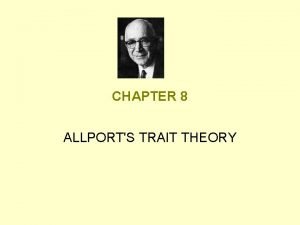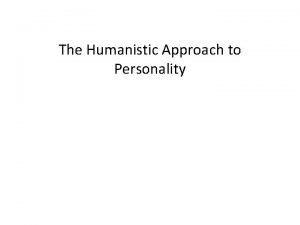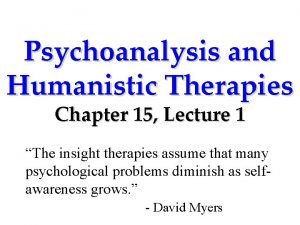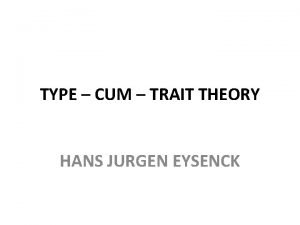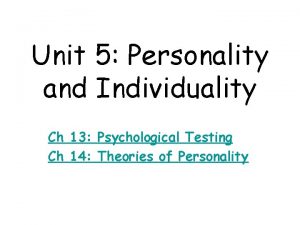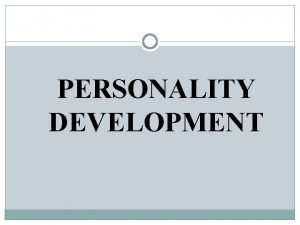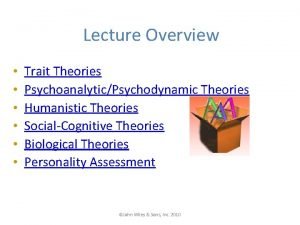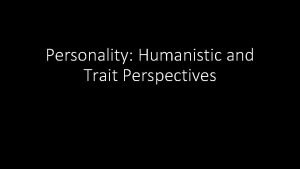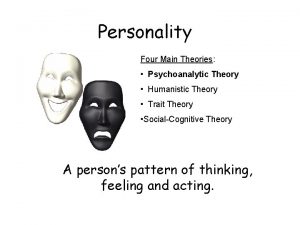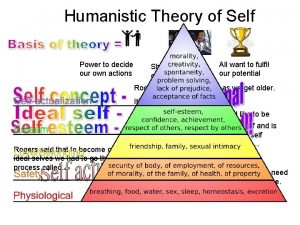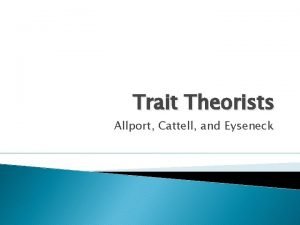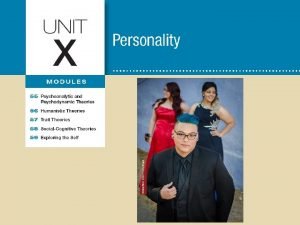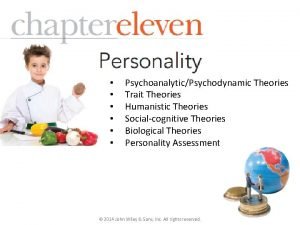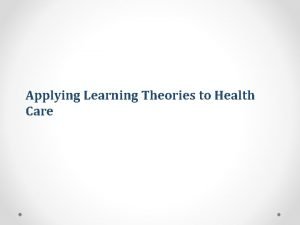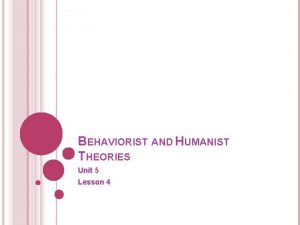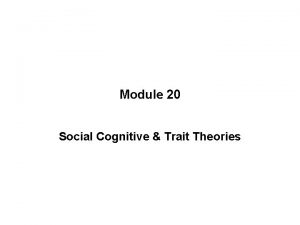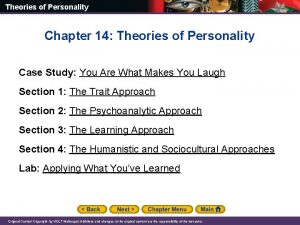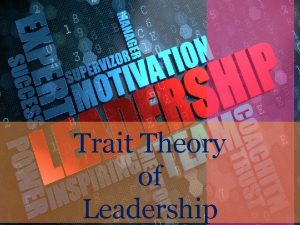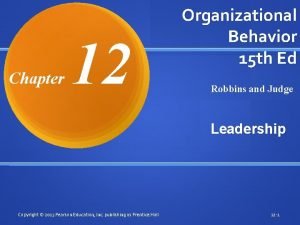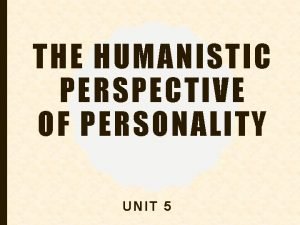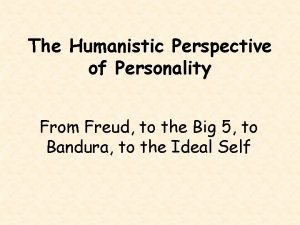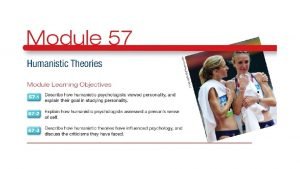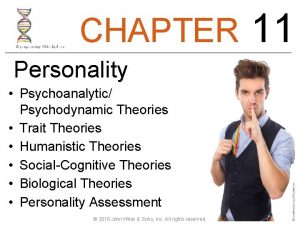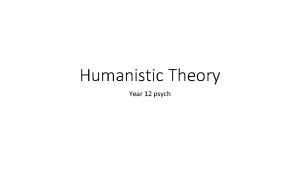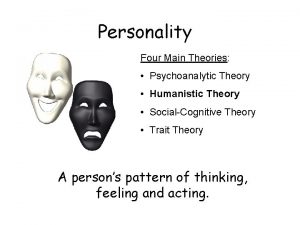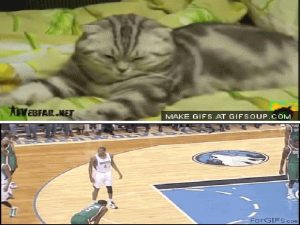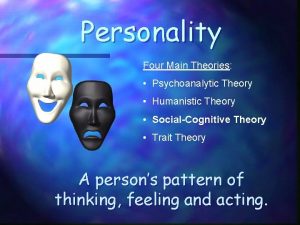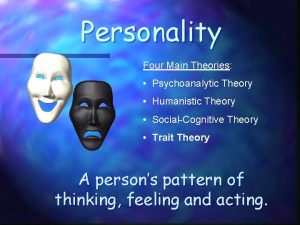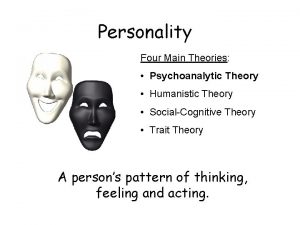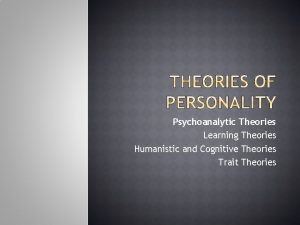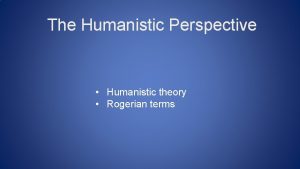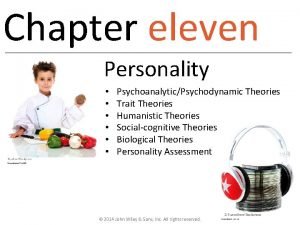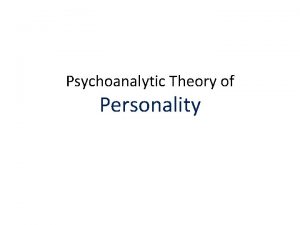Personality Personality Trait Theories Psychoanalytic Theory Humanistic Theories





























- Slides: 29

Personality • • • Personality Trait Theories Psychoanalytic Theory Humanistic Theories Social-Cognitive Theories

Personality An individual’s enduring response patterns across a variety of situations. Distinct and consistent ways of thinking, feeling and acting.

Keep in mind: • • Personality is a theoretical construct. Personality assessment or measurement is different depending on perspectives (theories). Personality psychology is concerned with disposition (internal); Social psychology is concerned with situation (external).

If someone asked you what I was like, what would you say?

Traits Predispositions to behave in given ways which are assessed by personality inventories.

Traits Adjectives that describe the ways people act.

Trait Theories • • • Description is the goal! Allport & Odbert (1936) found 18, 000 words in the dictionary that could describe personality. Since then, reduction has been the goal; synonyms have been eliminated through factor analysis.



Trait Theories Assessment Non-clinical Inventories • NEO-PI • Myers-Briggs Type Indicator Clinical Inventories • Minnesota Multiphasic Personality Inventory (MMPI)


Psychoanalytic Theory • • Clinical orientation GOAL: explain rather than describe Comprehensive theory Components to theory: • • • personality structures personality development dynamics and defenses


Psychoanalytic Theory Personality Structures • • • Id-pleasure principle Ego-reality principle Super Ego-conscience

Psychoanalytic Theory Personality Development

Psychoanalytic Theory Dynamics & Defenses • Unconscious conflicts>>>ANXIETY • • structural tension fixation unresolved Oedipal issues Defense mechanisms help us cope: • • repression sublimation

Psychoanalytic Theory Assessment • • • GOAL: uncover unconscious conflicts Rorschach Inkblot Test Thematic Apperception Test

Rorschach Inkblot Test Example #1

Rorschach Inkblot Test Example #2

Thematic Apperception Test Example #1

Thematic Apperception Test Example #2

Psychoanalytic Theory Assessment • • GOAL: uncover unconscious conflicts Rorschach Inkblot Test Thematic Apperception Test dream analysis

Humanistic Theories • • Abraham Maslow--self-actualization Carl Rogers--Person-Centered Perspective Self, self-concept--thoughts and feelings about ourselves, in answer to the question, “Who am I? ” Self-esteem-feelings of high or low selfworth.

Humanistic Theories Person-Centered Perspective Self-Growth is facilitated by: genuineness acceptance-unconditional positive regard empathy

Social-Cognitive Theories Reciprocal Determinism


Social Cognitive Theories Locus of Control--Julian Rotter • • Internal Locus of Control-perception that one controls one’s own fate External Locus of Control-chance or outside forces determine one’s fate How do you acquire a locus of control? How does locus of control determine your behavior?

Social Cognitive Theories Self-Monitoring--Mark Snyder • • High Self-Monitors social chameleons behavior is guided by situations have many friends persuaded by image • • Low Self-Monitors principled individuals behavior is guided by internal principles have few friends persuaded by facts

Social-Cognitive Theories Assessment …observing people’s behavior in different situations.
 Trait
Trait Http://www.outofservice.com/bigfive/
Http://www.outofservice.com/bigfive/ Psychoanalytic therapy is to as humanistic therapy is to
Psychoanalytic therapy is to as humanistic therapy is to Humanistic therapy aims to
Humanistic therapy aims to Type cum trait theory
Type cum trait theory Raymond cattell was a psychologist who ________.
Raymond cattell was a psychologist who ________. How to improve personality
How to improve personality Humanistic traits
Humanistic traits Humanistic theory of personality strengths and weaknesses
Humanistic theory of personality strengths and weaknesses Humanistic theory of personality
Humanistic theory of personality Humanistic approach
Humanistic approach Cardinal central and secondary traits
Cardinal central and secondary traits Eyseneck
Eyseneck Psychoanalytic theory defense mechanisms
Psychoanalytic theory defense mechanisms Social cognitive approaches to personality
Social cognitive approaches to personality Cognitive learning theorist
Cognitive learning theorist Humanist vs behaviorist
Humanist vs behaviorist Social cognitive personality
Social cognitive personality Chapter 14 theories of personality worksheet answers
Chapter 14 theories of personality worksheet answers Sublimation defense mechanism example
Sublimation defense mechanism example What does the psychoanalytic approach to personality teach?
What does the psychoanalytic approach to personality teach? Trait approaches to leadership
Trait approaches to leadership Module 58 trait theories
Module 58 trait theories Summarize the conclusions of trait theories of leadership.
Summarize the conclusions of trait theories of leadership. Summarize the conclusions of trait theories of leadership.
Summarize the conclusions of trait theories of leadership. Summarize the conclusions of trait theories of leadership.
Summarize the conclusions of trait theories of leadership. Latent trait theories
Latent trait theories Self actualized celebrities
Self actualized celebrities Humanistic perspective
Humanistic perspective Humanistic psychologists may assess personality by
Humanistic psychologists may assess personality by
